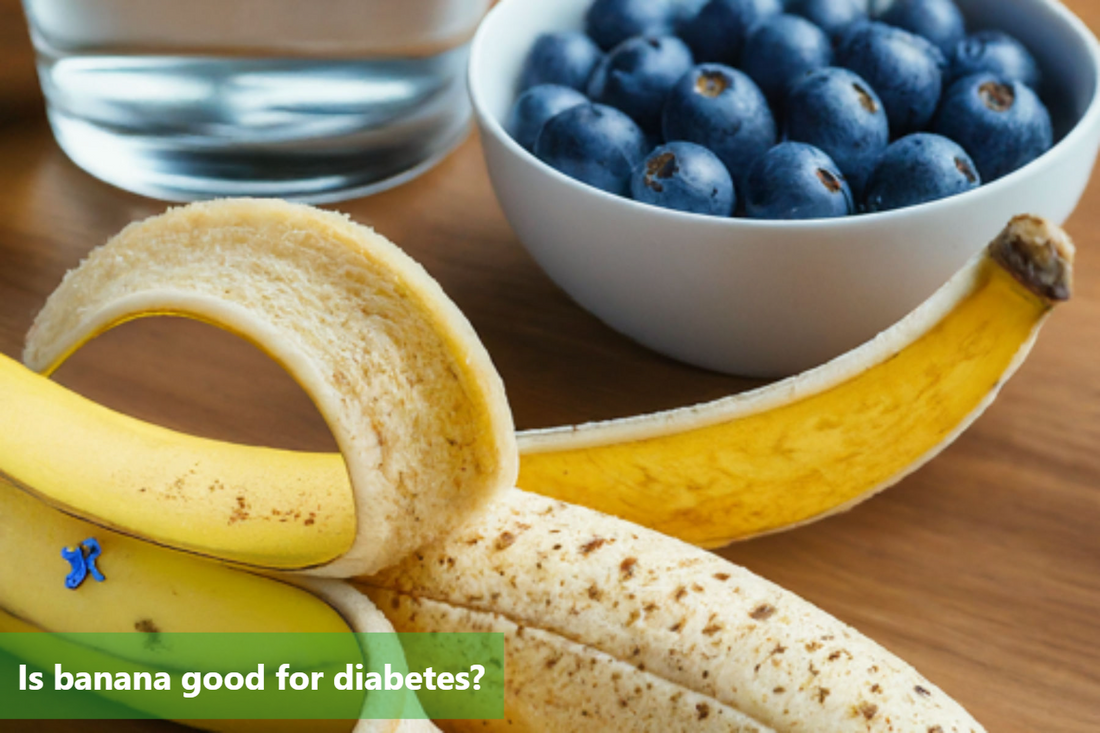Bananas are a popular and versatile fruit rich in essential nutrients like potassium, vitamin C, and fiber. Diet is crucial in diabetes management, as it affects blood sugar levels and overall health. For individuals with diabetes, bananas can be part of a balanced diet, but moderation is key due to their natural sugars. Despite this, their low glycemic index and fiber content make them unlikely to cause rapid blood sugar spikes when consumed in moderation. We will explore the nutritional benefits, effects on blood sugar, and practical tips for incorporating bananas into a diabetic diet.
Nutritional benefits of bananas for diabetics
he nutrition facts for 1 medium-sized banana (100 grams) are:
Calories |
89 |
Water |
75% |
Protein |
1.1 grams |
Carbs |
22.8 grams |
Sugar |
12.2 grams |
Fiber |
2.6 grams |
Fat |
0.3 grams |
Effect of bananas on blood sugar levels
Rapid Increase in Blood Sugar Levels
The glycemic index of bananas is relatively high, leading to a rapid increase in blood sugar levels due to the natural sugars present in bananas, such as sucrose, glucose, and fructose.
Moderating Effect of Fiber
The high fiber content in bananas plays a crucial role in moderating the rapid increase in blood sugar levels by slowing down the digestion and absorption of sugars, preventing sharp rises in blood sugar.
Influence of Resistant Starch
The presence of resistant starch in unripe bananas influences sugar metabolism by reducing the overall glycemic response, thus affecting blood glucose levels.
Incorporating bananas into a diabetic diet
Portion Control
For individuals with diabetes, it's essential to manage the carbohydrate intake by opting for smaller bananas or consuming a portion of a larger banana to prevent rapid spikes in blood sugar levels.
Meal Pairings
Combining a banana with a source of protein or healthy fat can help minimize its impact on blood sugar levels. For a balanced meal, consider pairing bananas with Greek yogurt or adding them to high-fiber smoothies with greens and protein.
Banana Ripeness
Choosing slightly unripe bananas can have a lower glycemic index compared to fully ripe ones, which can aid in better blood sugar management for individuals with diabetes.
Benefits of Bananas for Diabetes
Fiber content: Bananas are a good source of fiber, which helps regulate blood sugar levels and improve digestive health.
Low glycemic index: Bananas have a low glycemic index, meaning they do not cause sharp spikes in blood sugar levels.
Essential nutrients: Bananas contain important nutrients like vitamin C, vitamin B6, and potassium, contributing to overall health and well-being.
Carbohydrate awareness: Individuals with diabetes should monitor their carbohydrate intake and portion sizes when consuming bananas, as they typically contain around 27 grams of carbohydrates.
Balanced meal integration: It's important to incorporate bananas into a well-balanced meal plan and pair them with a source of protein or healthy fat to mitigate any potential impact on blood sugar levels.
To conclude:
When considering whether bananas are suitable for individuals with diabetes, it's important to note their nutritional value and effects on blood sugar levels. Bananas are rich in fiber, which helps regulate blood sugar. They also provide essential vitamins and minerals. However, their moderate glycemic index means they should be eaten in moderation. Those with diabetes must monitor portion sizes and blood sugar levels when consuming bananas. Consulting a healthcare professional or dietitian for personalized advice is recommended. In my experience, including bananas in my diabetic meal plan has been manageable with careful portion control and monitoring blood sugar levels. Overall, bananas can be part of a balanced diabetic diet when consumed mindfully and in moderation.
FAQs
Q: Are bananas good for managing diabetes? A: Yes, bananas can be included in a diabetes-friendly diet as they are low to medium on the glycemic index and provide essential nutrients like fiber, potassium, and vitamins.
Q: How many bananas can a person with diabetes eat in a day? A: It is recommended for individuals with diabetes to consume no more than 1 medium-sized banana per day, as part of a balanced meal plan.
Q: Do bananas cause blood sugar spikes in people with diabetes? A: While bananas contain natural sugars, their fiber content can help slow down the absorption of sugar into the bloodstream, reducing the likelihood of blood sugar spikes when eaten in moderation.
Q: Can people with diabetes eat ripe bananas? A: Ripe bananas are softer and sweeter but can still be consumed in moderation by individuals with diabetes, as the ripening process may break down some of the starches into sugars and increase the glycemic index slightly.
Q: What are the nutritional benefits of bananas for individuals with diabetes? A: Bananas are a good source of dietary fiber, which can aid in blood sugar control and digestive health. They also provide essential nutrients such as potassium, vitamin C, and vitamin B6, which are beneficial for overall health in those with diabetes.
This Blog post is an initiative by DiabeSmart, to provide accurate and Nutritionist / Doctor approved information related to Diabetes. DiabeSmart is India's first Food brand designed specifically for Diabetics, that has been clinically tested on Diabetics and Pre-Diabetics to deliver 55% - 70% lower Sugar spikes. DiabeSmart is part of Lo! Foods - India's leading brand for Everyday Functional Health foods.













